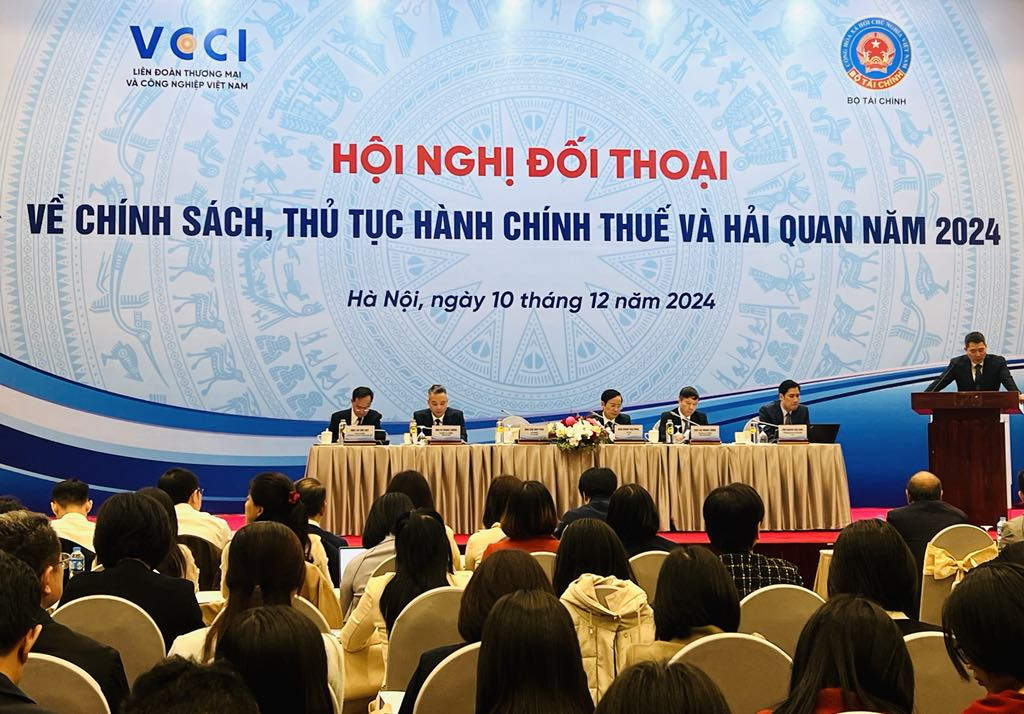At the 2024 Dialogue on Tax and Customs Policies, businesses raised long-standing issues with administrative hurdles, claiming significant financial losses.
While customs representatives emphasized their efforts to resolve these challenges, tax officials pledged accountability, including compensation, should court rulings find their actions unlawful.

Ngo Manh Hung, legal representative of Thai Binh Cotton Company, shared his company’s plight, which is mirrored by other textile businesses in Thai Binh Province. These firms rely on imported cotton waste as raw material for producing OE yarn.
“In late 2023 and early 2024, customs in Hai Phong collected and analyzed samples of imported cotton waste, sending them to the Ministry of Industry and Trade's Textile Institute. The results classified the material as ‘cotton scrap,’ rendering it ineligible for clearance,” Hung explained.
The Ministry of Industry and Trade’s Department of Industry, however, clarified that Vietnam lacks specific standards for cotton waste, making the Textile Institute’s classification unsupported. Despite this, customs authorities have yet to provide a resolution, leaving businesses in limbo.
As a result, some companies face closure due to a lack of raw materials, while others operate at minimal capacity by purchasing cotton waste from other importers, incurring high costs. “For nearly a year, we’ve paid exorbitant storage fees, amounting to billions of dong,” Hung lamented.
In response, Deputy General Director of Customs Luu Manh Tuong acknowledged the issue and distinguished between "coarse combed" and "finely combed" cotton waste. Finely combed waste, which contains fewer impurities, is considered a permissible raw material. However, coarse combed waste often has impurity levels exceeding 40%, making it problematic.
Tuong stated that customs had collaborated with multiple ministries to address the issue but stressed that all businesses importing coarse combed cotton waste are currently facing challenges. “We have done everything within our authority and reported the matter to the government,” he added.
Unsatisfied with this response, Hung urged a joint delegation from relevant ministries to inspect OE yarn production facilities firsthand to recommend appropriate policies.
Pham Minh Khoa, Director of An Phat Import-Export Company, recounted his ongoing battle with tax authorities over VAT refunds.
The dispute centers on two VAT refund periods (32 and 33), during which An Phat exported over 12,300 tons of cassava starch to Chinese firms. While customs confirmed the exports, tax authorities refused to issue refunds, alleging fraudulent transactions.
Khoa asserted that An Phat’s documentation was identical to 31 prior successful refund periods but faced rejection for VAT refunds worth VND 11.5 billion in periods 32 and 33. “Tax authorities based their decision on a lack of judicial assistance responses from China, but who will bear the losses this has caused us?” he asked.
An Phat filed a lawsuit against the tax authorities with the People’s Court of Ba Dinh District, Hanoi, on June 20, 2024.
Deputy Director General of Taxation Vu Manh Cuong explained that An Phat’s case involved high risks, with investigations revealing that some importers were either non-existent or denied economic relations with An Phat. “When importers do not exist or deny importing goods, the legality of contracts comes into question, disqualifying VAT refunds,” Cuong said.
Cuong assured that the tax authority would fully comply with court rulings. “If the court finds us at fault, we will accept responsibility and provide compensation,” he affirmed.
Vu Truong Thinh, CEO of XUMI Vietnam Group, highlighted challenges faced by businesses purchasing scrap materials. Many sellers lack accounting systems and invoices, complicating tax compliance for buyers.
This long-standing issue, Thinh argued, not only hampers legitimate business operations but also contributes to tax revenue losses. He proposed a solution allowing buyers to pay taxes on behalf of sellers, aligning with legal provisions for individual business households.
Acknowledging this challenge, Deputy Director General Cuong noted that direct scrap collectors are only required to issue lists, not invoices. However, he raised concerns about the risk of smuggled goods infiltrating the system.
To address broader tax issues, the General Department of Taxation is developing a "voluntary tax compliance" program. Cuong explained, “Businesses that collaborate with tax authorities from the start will experience expedited VAT refunds. The compliance criteria will soon be published for interested companies to register.”
Binh Minh